Applied Sport and Exercise Psychology for Baseball Athlete Shaun Murphy
VerifiedAdded on 2023/06/11
|16
|4312
|337
AI Summary
This article discusses the six-week psychological training program for baseball athlete Shaun Murphy, including strengths and weaknesses identified through the Athlete Coping Skills Inventory (ACSI) and techniques used to improve them. The program aims to improve Murphy's concentration, mental preparation, confidence, and ability to work independently. The techniques used include mental rehearsal, imagery, self-talk, breathing control, and meditation.
Contribute Materials
Your contribution can guide someone’s learning journey. Share your
documents today.
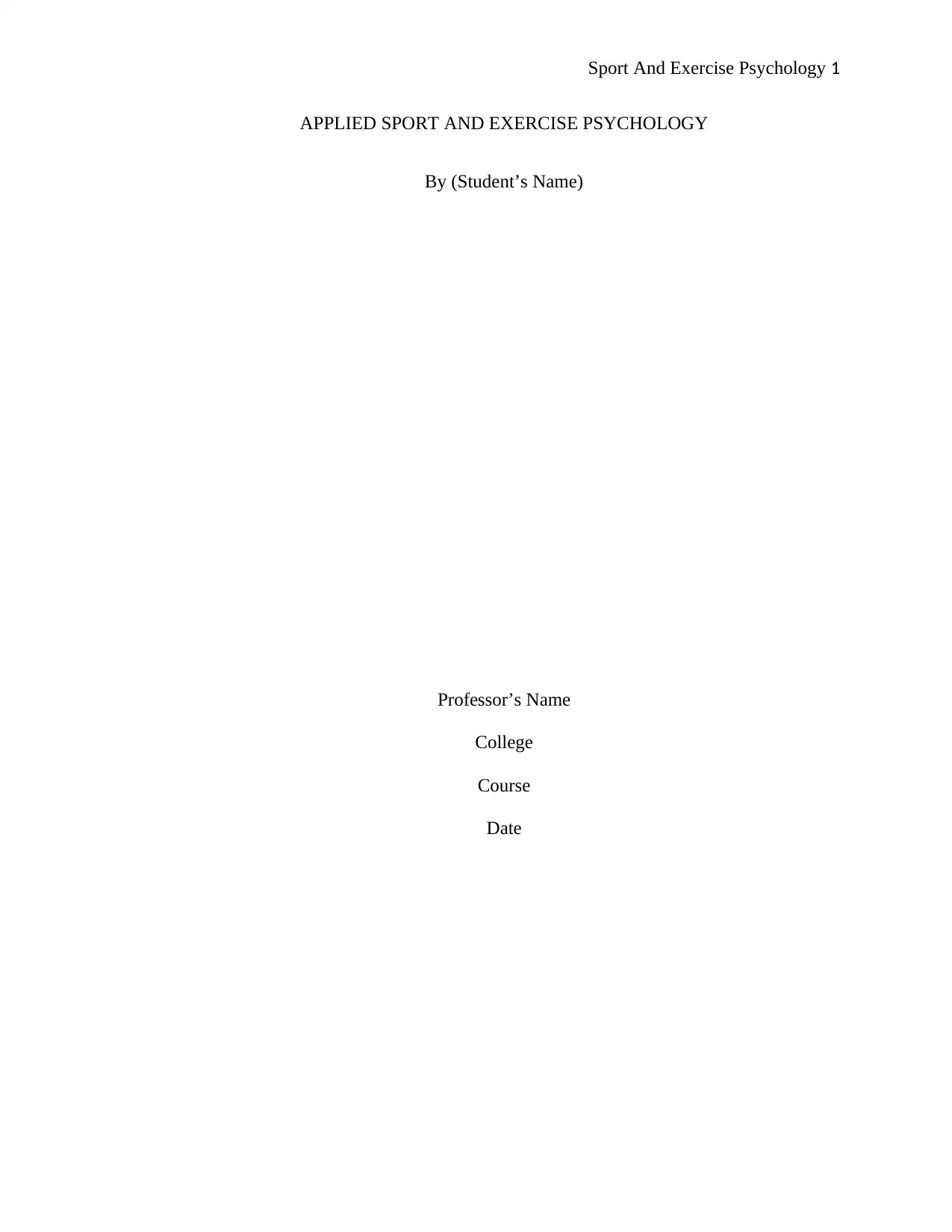
Sport And Exercise Psychology 1
APPLIED SPORT AND EXERCISE PSYCHOLOGY
By (Student’s Name)
Professor’s Name
College
Course
Date
APPLIED SPORT AND EXERCISE PSYCHOLOGY
By (Student’s Name)
Professor’s Name
College
Course
Date
Secure Best Marks with AI Grader
Need help grading? Try our AI Grader for instant feedback on your assignments.
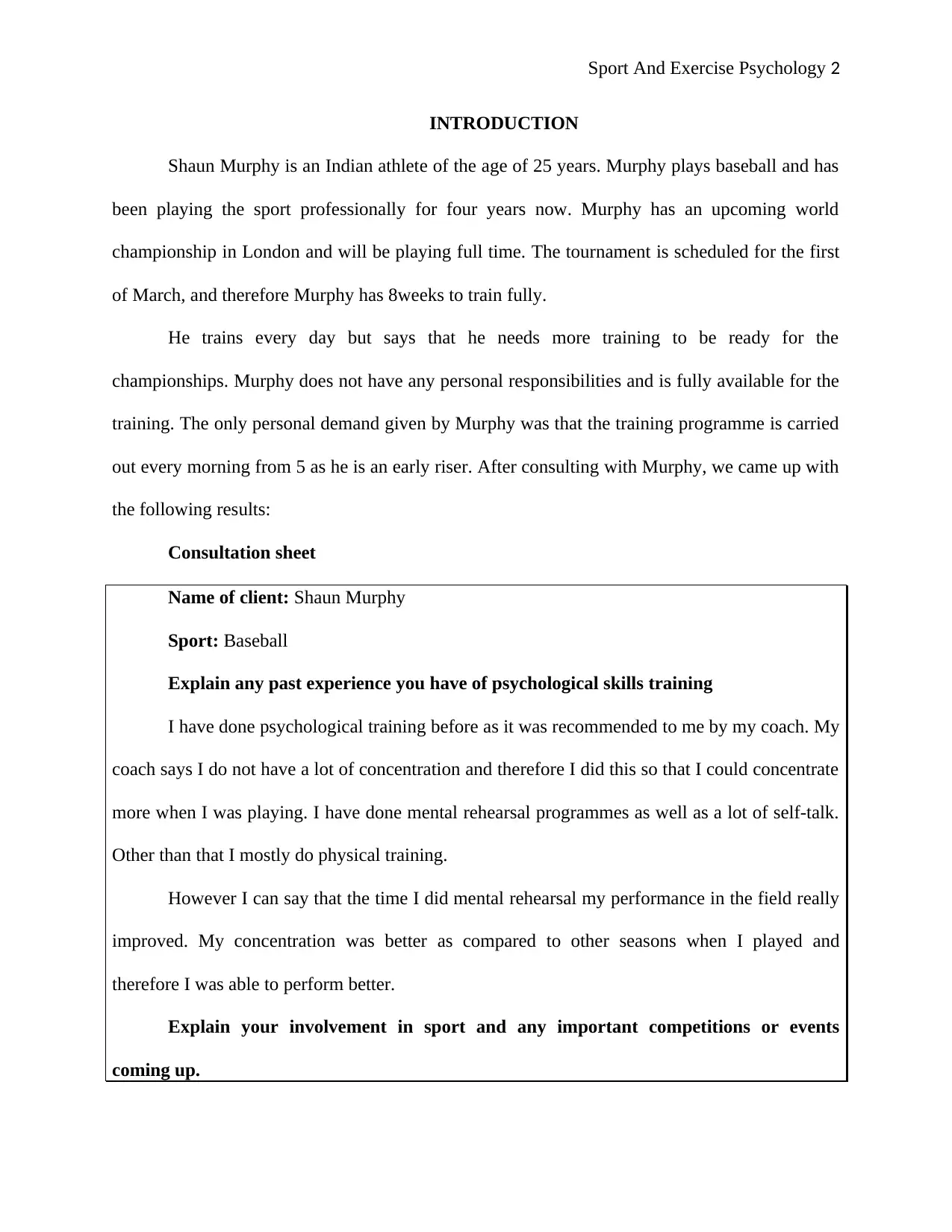
Sport And Exercise Psychology 2
INTRODUCTION
Shaun Murphy is an Indian athlete of the age of 25 years. Murphy plays baseball and has
been playing the sport professionally for four years now. Murphy has an upcoming world
championship in London and will be playing full time. The tournament is scheduled for the first
of March, and therefore Murphy has 8weeks to train fully.
He trains every day but says that he needs more training to be ready for the
championships. Murphy does not have any personal responsibilities and is fully available for the
training. The only personal demand given by Murphy was that the training programme is carried
out every morning from 5 as he is an early riser. After consulting with Murphy, we came up with
the following results:
Consultation sheet
Name of client: Shaun Murphy
Sport: Baseball
Explain any past experience you have of psychological skills training
I have done psychological training before as it was recommended to me by my coach. My
coach says I do not have a lot of concentration and therefore I did this so that I could concentrate
more when I was playing. I have done mental rehearsal programmes as well as a lot of self-talk.
Other than that I mostly do physical training.
However I can say that the time I did mental rehearsal my performance in the field really
improved. My concentration was better as compared to other seasons when I played and
therefore I was able to perform better.
Explain your involvement in sport and any important competitions or events
coming up.
INTRODUCTION
Shaun Murphy is an Indian athlete of the age of 25 years. Murphy plays baseball and has
been playing the sport professionally for four years now. Murphy has an upcoming world
championship in London and will be playing full time. The tournament is scheduled for the first
of March, and therefore Murphy has 8weeks to train fully.
He trains every day but says that he needs more training to be ready for the
championships. Murphy does not have any personal responsibilities and is fully available for the
training. The only personal demand given by Murphy was that the training programme is carried
out every morning from 5 as he is an early riser. After consulting with Murphy, we came up with
the following results:
Consultation sheet
Name of client: Shaun Murphy
Sport: Baseball
Explain any past experience you have of psychological skills training
I have done psychological training before as it was recommended to me by my coach. My
coach says I do not have a lot of concentration and therefore I did this so that I could concentrate
more when I was playing. I have done mental rehearsal programmes as well as a lot of self-talk.
Other than that I mostly do physical training.
However I can say that the time I did mental rehearsal my performance in the field really
improved. My concentration was better as compared to other seasons when I played and
therefore I was able to perform better.
Explain your involvement in sport and any important competitions or events
coming up.
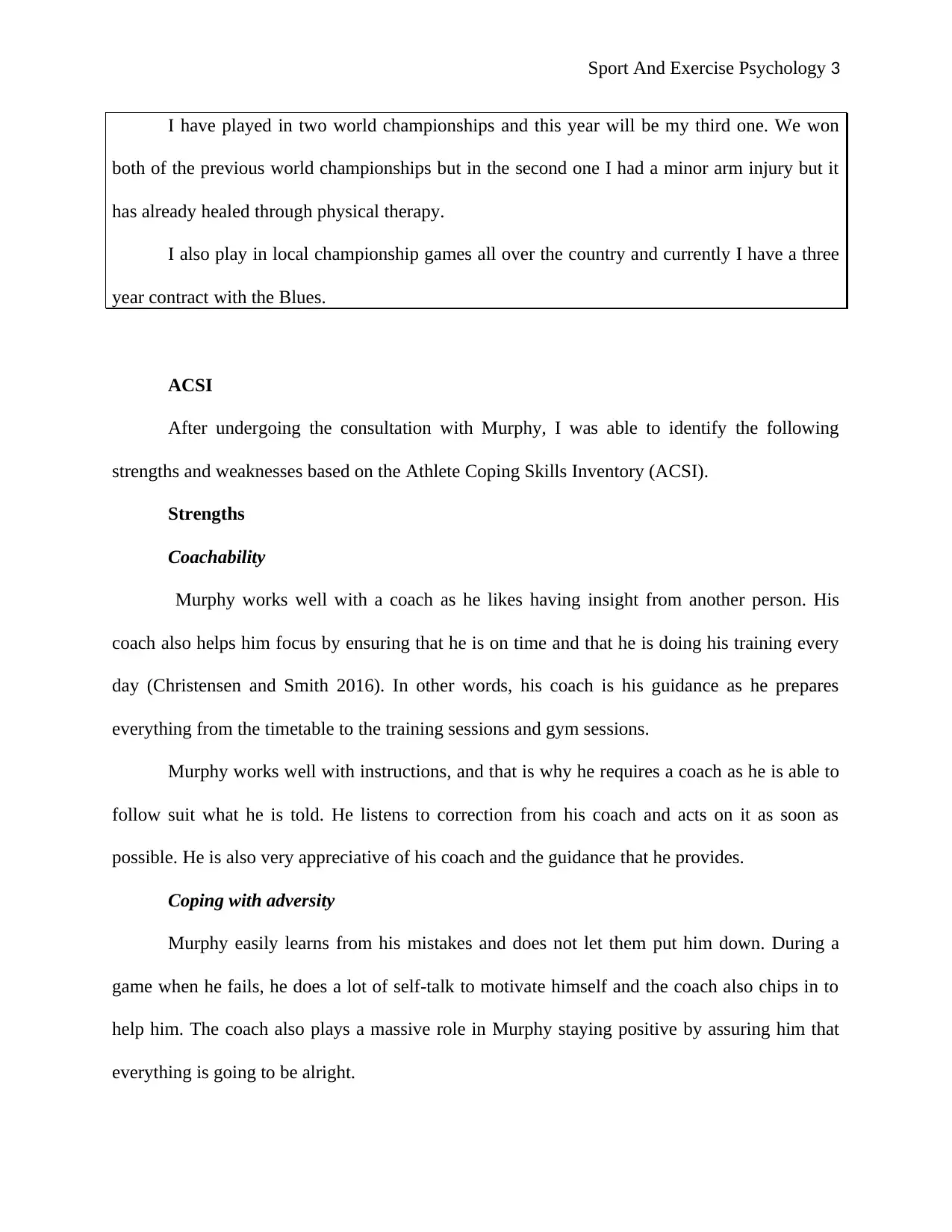
Sport And Exercise Psychology 3
I have played in two world championships and this year will be my third one. We won
both of the previous world championships but in the second one I had a minor arm injury but it
has already healed through physical therapy.
I also play in local championship games all over the country and currently I have a three
year contract with the Blues.
ACSI
After undergoing the consultation with Murphy, I was able to identify the following
strengths and weaknesses based on the Athlete Coping Skills Inventory (ACSI).
Strengths
Coachability
Murphy works well with a coach as he likes having insight from another person. His
coach also helps him focus by ensuring that he is on time and that he is doing his training every
day (Christensen and Smith 2016). In other words, his coach is his guidance as he prepares
everything from the timetable to the training sessions and gym sessions.
Murphy works well with instructions, and that is why he requires a coach as he is able to
follow suit what he is told. He listens to correction from his coach and acts on it as soon as
possible. He is also very appreciative of his coach and the guidance that he provides.
Coping with adversity
Murphy easily learns from his mistakes and does not let them put him down. During a
game when he fails, he does a lot of self-talk to motivate himself and the coach also chips in to
help him. The coach also plays a massive role in Murphy staying positive by assuring him that
everything is going to be alright.
I have played in two world championships and this year will be my third one. We won
both of the previous world championships but in the second one I had a minor arm injury but it
has already healed through physical therapy.
I also play in local championship games all over the country and currently I have a three
year contract with the Blues.
ACSI
After undergoing the consultation with Murphy, I was able to identify the following
strengths and weaknesses based on the Athlete Coping Skills Inventory (ACSI).
Strengths
Coachability
Murphy works well with a coach as he likes having insight from another person. His
coach also helps him focus by ensuring that he is on time and that he is doing his training every
day (Christensen and Smith 2016). In other words, his coach is his guidance as he prepares
everything from the timetable to the training sessions and gym sessions.
Murphy works well with instructions, and that is why he requires a coach as he is able to
follow suit what he is told. He listens to correction from his coach and acts on it as soon as
possible. He is also very appreciative of his coach and the guidance that he provides.
Coping with adversity
Murphy easily learns from his mistakes and does not let them put him down. During a
game when he fails, he does a lot of self-talk to motivate himself and the coach also chips in to
help him. The coach also plays a massive role in Murphy staying positive by assuring him that
everything is going to be alright.
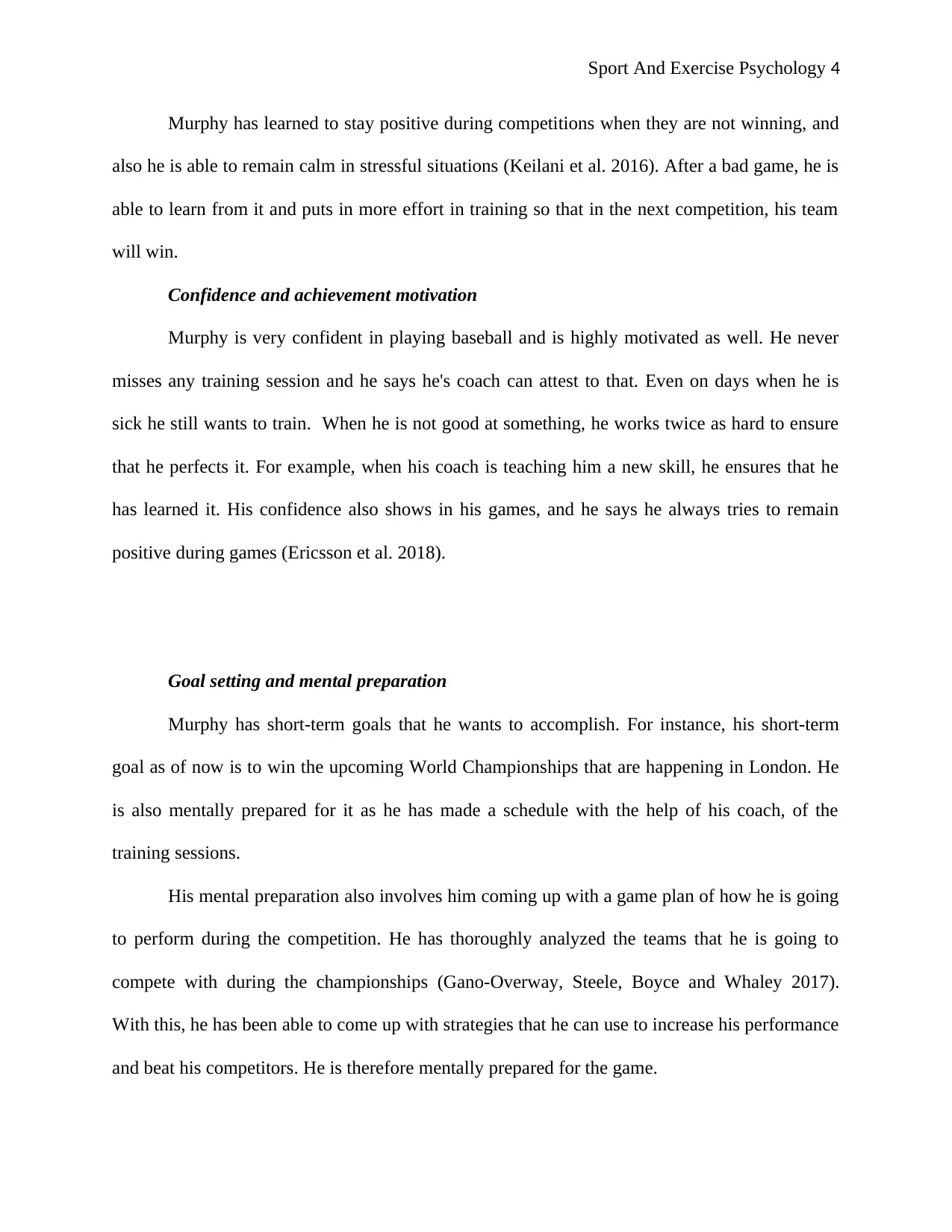
Sport And Exercise Psychology 4
Murphy has learned to stay positive during competitions when they are not winning, and
also he is able to remain calm in stressful situations (Keilani et al. 2016). After a bad game, he is
able to learn from it and puts in more effort in training so that in the next competition, his team
will win.
Confidence and achievement motivation
Murphy is very confident in playing baseball and is highly motivated as well. He never
misses any training session and he says he's coach can attest to that. Even on days when he is
sick he still wants to train. When he is not good at something, he works twice as hard to ensure
that he perfects it. For example, when his coach is teaching him a new skill, he ensures that he
has learned it. His confidence also shows in his games, and he says he always tries to remain
positive during games (Ericsson et al. 2018).
Goal setting and mental preparation
Murphy has short-term goals that he wants to accomplish. For instance, his short-term
goal as of now is to win the upcoming World Championships that are happening in London. He
is also mentally prepared for it as he has made a schedule with the help of his coach, of the
training sessions.
His mental preparation also involves him coming up with a game plan of how he is going
to perform during the competition. He has thoroughly analyzed the teams that he is going to
compete with during the championships (Gano-Overway, Steele, Boyce and Whaley 2017).
With this, he has been able to come up with strategies that he can use to increase his performance
and beat his competitors. He is therefore mentally prepared for the game.
Murphy has learned to stay positive during competitions when they are not winning, and
also he is able to remain calm in stressful situations (Keilani et al. 2016). After a bad game, he is
able to learn from it and puts in more effort in training so that in the next competition, his team
will win.
Confidence and achievement motivation
Murphy is very confident in playing baseball and is highly motivated as well. He never
misses any training session and he says he's coach can attest to that. Even on days when he is
sick he still wants to train. When he is not good at something, he works twice as hard to ensure
that he perfects it. For example, when his coach is teaching him a new skill, he ensures that he
has learned it. His confidence also shows in his games, and he says he always tries to remain
positive during games (Ericsson et al. 2018).
Goal setting and mental preparation
Murphy has short-term goals that he wants to accomplish. For instance, his short-term
goal as of now is to win the upcoming World Championships that are happening in London. He
is also mentally prepared for it as he has made a schedule with the help of his coach, of the
training sessions.
His mental preparation also involves him coming up with a game plan of how he is going
to perform during the competition. He has thoroughly analyzed the teams that he is going to
compete with during the championships (Gano-Overway, Steele, Boyce and Whaley 2017).
With this, he has been able to come up with strategies that he can use to increase his performance
and beat his competitors. He is therefore mentally prepared for the game.
Secure Best Marks with AI Grader
Need help grading? Try our AI Grader for instant feedback on your assignments.
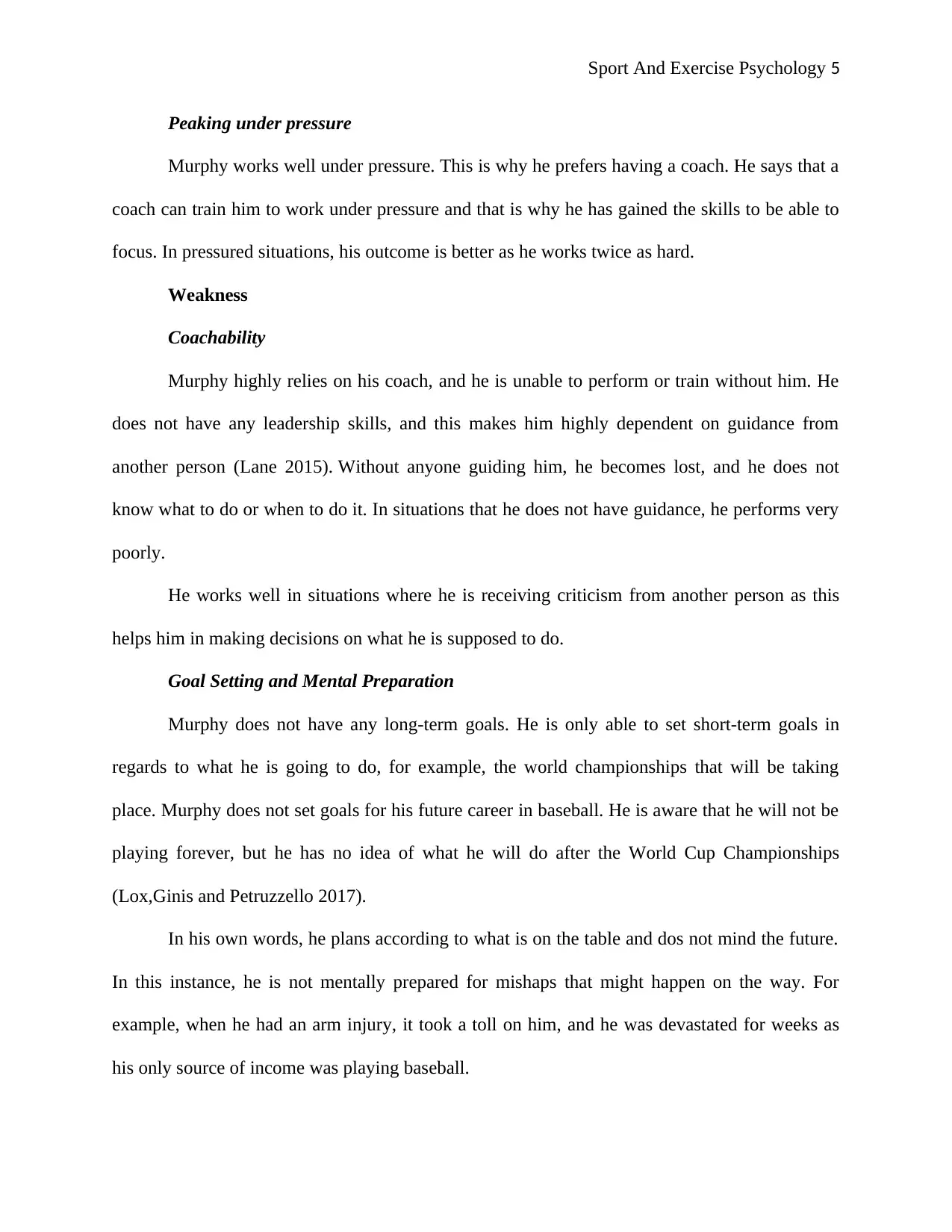
Sport And Exercise Psychology 5
Peaking under pressure
Murphy works well under pressure. This is why he prefers having a coach. He says that a
coach can train him to work under pressure and that is why he has gained the skills to be able to
focus. In pressured situations, his outcome is better as he works twice as hard.
Weakness
Coachability
Murphy highly relies on his coach, and he is unable to perform or train without him. He
does not have any leadership skills, and this makes him highly dependent on guidance from
another person (Lane 2015). Without anyone guiding him, he becomes lost, and he does not
know what to do or when to do it. In situations that he does not have guidance, he performs very
poorly.
He works well in situations where he is receiving criticism from another person as this
helps him in making decisions on what he is supposed to do.
Goal Setting and Mental Preparation
Murphy does not have any long-term goals. He is only able to set short-term goals in
regards to what he is going to do, for example, the world championships that will be taking
place. Murphy does not set goals for his future career in baseball. He is aware that he will not be
playing forever, but he has no idea of what he will do after the World Cup Championships
(Lox,Ginis and Petruzzello 2017).
In his own words, he plans according to what is on the table and dos not mind the future.
In this instance, he is not mentally prepared for mishaps that might happen on the way. For
example, when he had an arm injury, it took a toll on him, and he was devastated for weeks as
his only source of income was playing baseball.
Peaking under pressure
Murphy works well under pressure. This is why he prefers having a coach. He says that a
coach can train him to work under pressure and that is why he has gained the skills to be able to
focus. In pressured situations, his outcome is better as he works twice as hard.
Weakness
Coachability
Murphy highly relies on his coach, and he is unable to perform or train without him. He
does not have any leadership skills, and this makes him highly dependent on guidance from
another person (Lane 2015). Without anyone guiding him, he becomes lost, and he does not
know what to do or when to do it. In situations that he does not have guidance, he performs very
poorly.
He works well in situations where he is receiving criticism from another person as this
helps him in making decisions on what he is supposed to do.
Goal Setting and Mental Preparation
Murphy does not have any long-term goals. He is only able to set short-term goals in
regards to what he is going to do, for example, the world championships that will be taking
place. Murphy does not set goals for his future career in baseball. He is aware that he will not be
playing forever, but he has no idea of what he will do after the World Cup Championships
(Lox,Ginis and Petruzzello 2017).
In his own words, he plans according to what is on the table and dos not mind the future.
In this instance, he is not mentally prepared for mishaps that might happen on the way. For
example, when he had an arm injury, it took a toll on him, and he was devastated for weeks as
his only source of income was playing baseball.
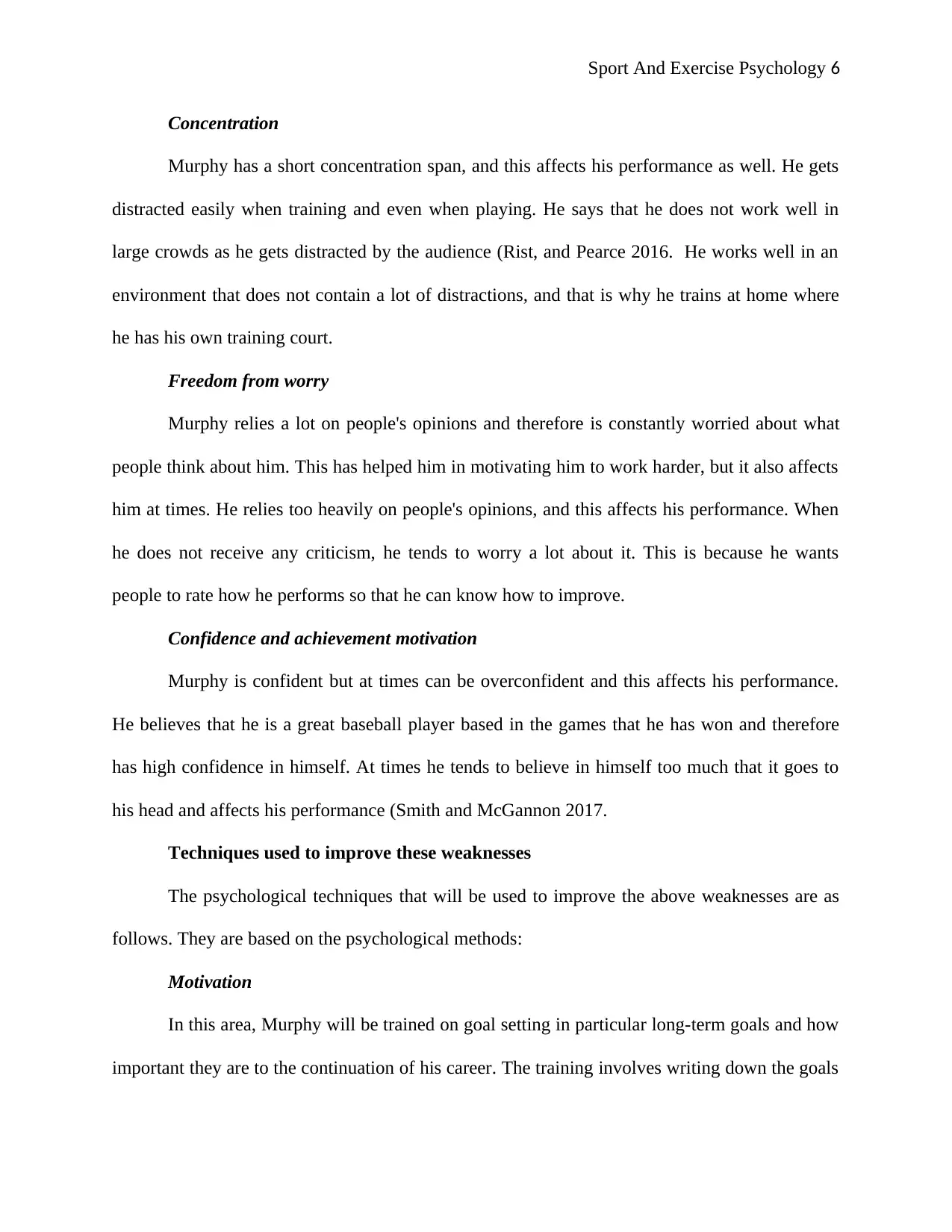
Sport And Exercise Psychology 6
Concentration
Murphy has a short concentration span, and this affects his performance as well. He gets
distracted easily when training and even when playing. He says that he does not work well in
large crowds as he gets distracted by the audience (Rist, and Pearce 2016. He works well in an
environment that does not contain a lot of distractions, and that is why he trains at home where
he has his own training court.
Freedom from worry
Murphy relies a lot on people's opinions and therefore is constantly worried about what
people think about him. This has helped him in motivating him to work harder, but it also affects
him at times. He relies too heavily on people's opinions, and this affects his performance. When
he does not receive any criticism, he tends to worry a lot about it. This is because he wants
people to rate how he performs so that he can know how to improve.
Confidence and achievement motivation
Murphy is confident but at times can be overconfident and this affects his performance.
He believes that he is a great baseball player based in the games that he has won and therefore
has high confidence in himself. At times he tends to believe in himself too much that it goes to
his head and affects his performance (Smith and McGannon 2017.
Techniques used to improve these weaknesses
The psychological techniques that will be used to improve the above weaknesses are as
follows. They are based on the psychological methods:
Motivation
In this area, Murphy will be trained on goal setting in particular long-term goals and how
important they are to the continuation of his career. The training involves writing down the goals
Concentration
Murphy has a short concentration span, and this affects his performance as well. He gets
distracted easily when training and even when playing. He says that he does not work well in
large crowds as he gets distracted by the audience (Rist, and Pearce 2016. He works well in an
environment that does not contain a lot of distractions, and that is why he trains at home where
he has his own training court.
Freedom from worry
Murphy relies a lot on people's opinions and therefore is constantly worried about what
people think about him. This has helped him in motivating him to work harder, but it also affects
him at times. He relies too heavily on people's opinions, and this affects his performance. When
he does not receive any criticism, he tends to worry a lot about it. This is because he wants
people to rate how he performs so that he can know how to improve.
Confidence and achievement motivation
Murphy is confident but at times can be overconfident and this affects his performance.
He believes that he is a great baseball player based in the games that he has won and therefore
has high confidence in himself. At times he tends to believe in himself too much that it goes to
his head and affects his performance (Smith and McGannon 2017.
Techniques used to improve these weaknesses
The psychological techniques that will be used to improve the above weaknesses are as
follows. They are based on the psychological methods:
Motivation
In this area, Murphy will be trained on goal setting in particular long-term goals and how
important they are to the continuation of his career. The training involves writing down the goals
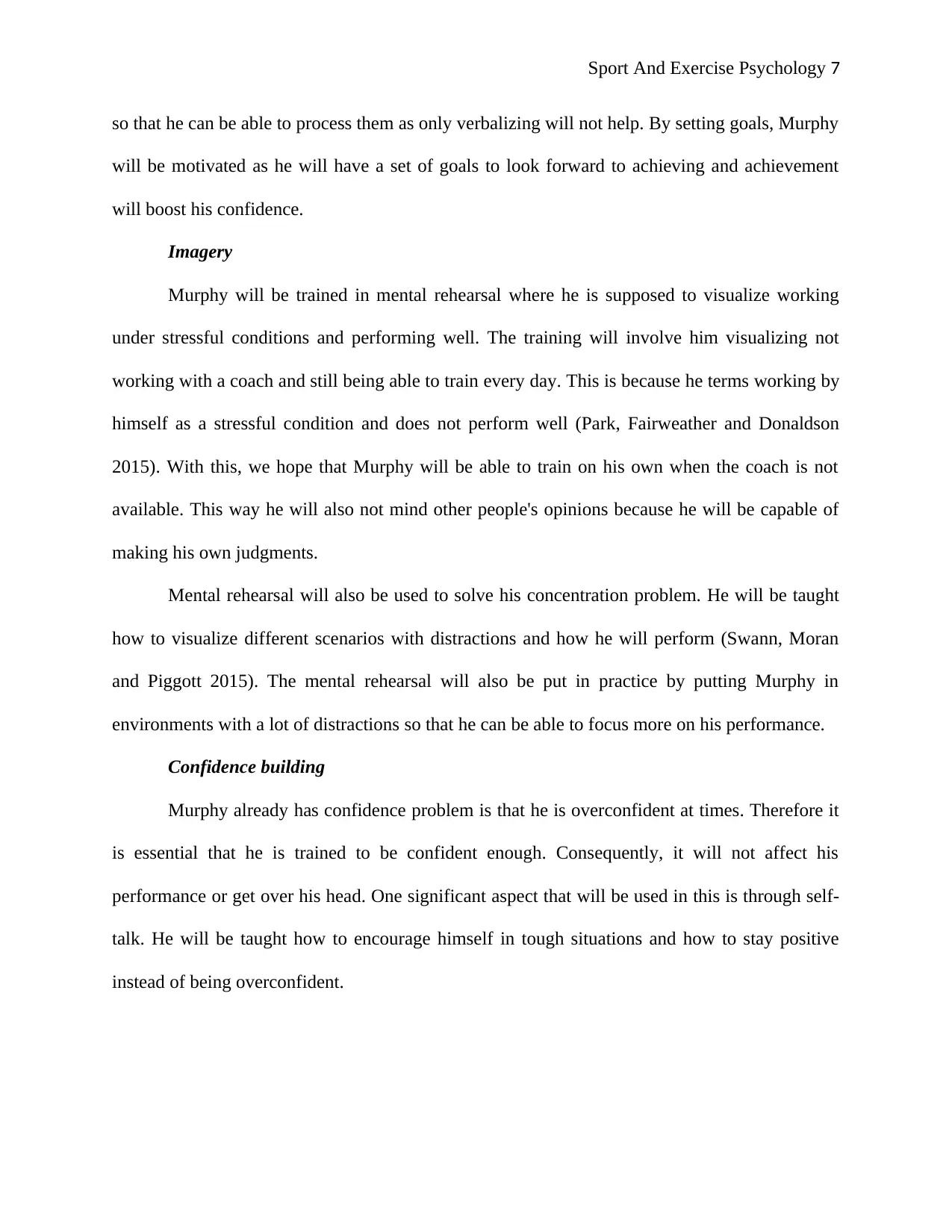
Sport And Exercise Psychology 7
so that he can be able to process them as only verbalizing will not help. By setting goals, Murphy
will be motivated as he will have a set of goals to look forward to achieving and achievement
will boost his confidence.
Imagery
Murphy will be trained in mental rehearsal where he is supposed to visualize working
under stressful conditions and performing well. The training will involve him visualizing not
working with a coach and still being able to train every day. This is because he terms working by
himself as a stressful condition and does not perform well (Park, Fairweather and Donaldson
2015). With this, we hope that Murphy will be able to train on his own when the coach is not
available. This way he will also not mind other people's opinions because he will be capable of
making his own judgments.
Mental rehearsal will also be used to solve his concentration problem. He will be taught
how to visualize different scenarios with distractions and how he will perform (Swann, Moran
and Piggott 2015). The mental rehearsal will also be put in practice by putting Murphy in
environments with a lot of distractions so that he can be able to focus more on his performance.
Confidence building
Murphy already has confidence problem is that he is overconfident at times. Therefore it
is essential that he is trained to be confident enough. Consequently, it will not affect his
performance or get over his head. One significant aspect that will be used in this is through self-
talk. He will be taught how to encourage himself in tough situations and how to stay positive
instead of being overconfident.
so that he can be able to process them as only verbalizing will not help. By setting goals, Murphy
will be motivated as he will have a set of goals to look forward to achieving and achievement
will boost his confidence.
Imagery
Murphy will be trained in mental rehearsal where he is supposed to visualize working
under stressful conditions and performing well. The training will involve him visualizing not
working with a coach and still being able to train every day. This is because he terms working by
himself as a stressful condition and does not perform well (Park, Fairweather and Donaldson
2015). With this, we hope that Murphy will be able to train on his own when the coach is not
available. This way he will also not mind other people's opinions because he will be capable of
making his own judgments.
Mental rehearsal will also be used to solve his concentration problem. He will be taught
how to visualize different scenarios with distractions and how he will perform (Swann, Moran
and Piggott 2015). The mental rehearsal will also be put in practice by putting Murphy in
environments with a lot of distractions so that he can be able to focus more on his performance.
Confidence building
Murphy already has confidence problem is that he is overconfident at times. Therefore it
is essential that he is trained to be confident enough. Consequently, it will not affect his
performance or get over his head. One significant aspect that will be used in this is through self-
talk. He will be taught how to encourage himself in tough situations and how to stay positive
instead of being overconfident.
Paraphrase This Document
Need a fresh take? Get an instant paraphrase of this document with our AI Paraphraser
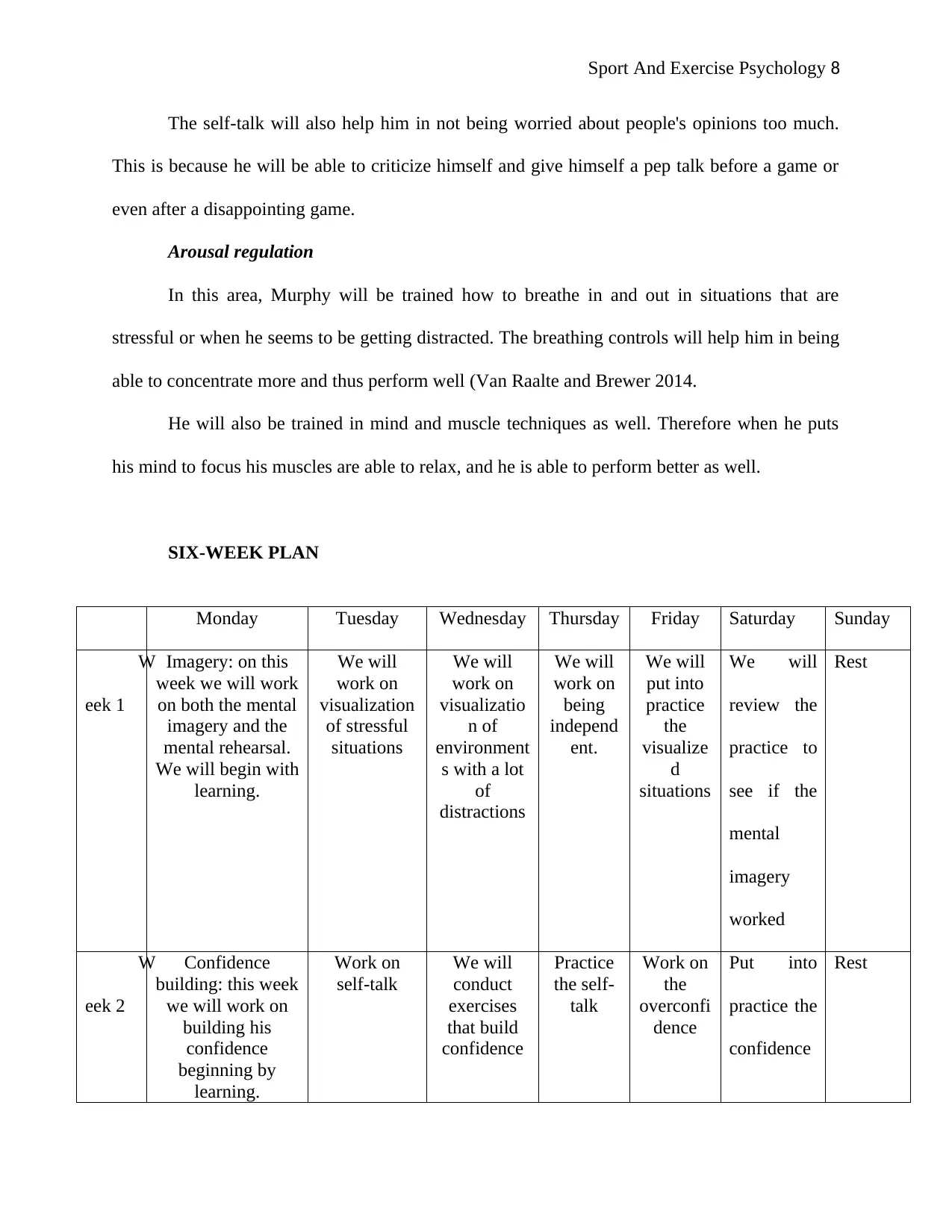
Sport And Exercise Psychology 8
The self-talk will also help him in not being worried about people's opinions too much.
This is because he will be able to criticize himself and give himself a pep talk before a game or
even after a disappointing game.
Arousal regulation
In this area, Murphy will be trained how to breathe in and out in situations that are
stressful or when he seems to be getting distracted. The breathing controls will help him in being
able to concentrate more and thus perform well (Van Raalte and Brewer 2014.
He will also be trained in mind and muscle techniques as well. Therefore when he puts
his mind to focus his muscles are able to relax, and he is able to perform better as well.
SIX-WEEK PLAN
Monday Tuesday Wednesday Thursday Friday Saturday Sunday
W
eek 1
Imagery: on this
week we will work
on both the mental
imagery and the
mental rehearsal.
We will begin with
learning.
We will
work on
visualization
of stressful
situations
We will
work on
visualizatio
n of
environment
s with a lot
of
distractions
We will
work on
being
independ
ent.
We will
put into
practice
the
visualize
d
situations
We will
review the
practice to
see if the
mental
imagery
worked
Rest
W
eek 2
Confidence
building: this week
we will work on
building his
confidence
beginning by
learning.
Work on
self-talk
We will
conduct
exercises
that build
confidence
Practice
the self-
talk
Work on
the
overconfi
dence
Put into
practice the
confidence
Rest
The self-talk will also help him in not being worried about people's opinions too much.
This is because he will be able to criticize himself and give himself a pep talk before a game or
even after a disappointing game.
Arousal regulation
In this area, Murphy will be trained how to breathe in and out in situations that are
stressful or when he seems to be getting distracted. The breathing controls will help him in being
able to concentrate more and thus perform well (Van Raalte and Brewer 2014.
He will also be trained in mind and muscle techniques as well. Therefore when he puts
his mind to focus his muscles are able to relax, and he is able to perform better as well.
SIX-WEEK PLAN
Monday Tuesday Wednesday Thursday Friday Saturday Sunday
W
eek 1
Imagery: on this
week we will work
on both the mental
imagery and the
mental rehearsal.
We will begin with
learning.
We will
work on
visualization
of stressful
situations
We will
work on
visualizatio
n of
environment
s with a lot
of
distractions
We will
work on
being
independ
ent.
We will
put into
practice
the
visualize
d
situations
We will
review the
practice to
see if the
mental
imagery
worked
Rest
W
eek 2
Confidence
building: this week
we will work on
building his
confidence
beginning by
learning.
Work on
self-talk
We will
conduct
exercises
that build
confidence
Practice
the self-
talk
Work on
the
overconfi
dence
Put into
practice the
confidence
Rest
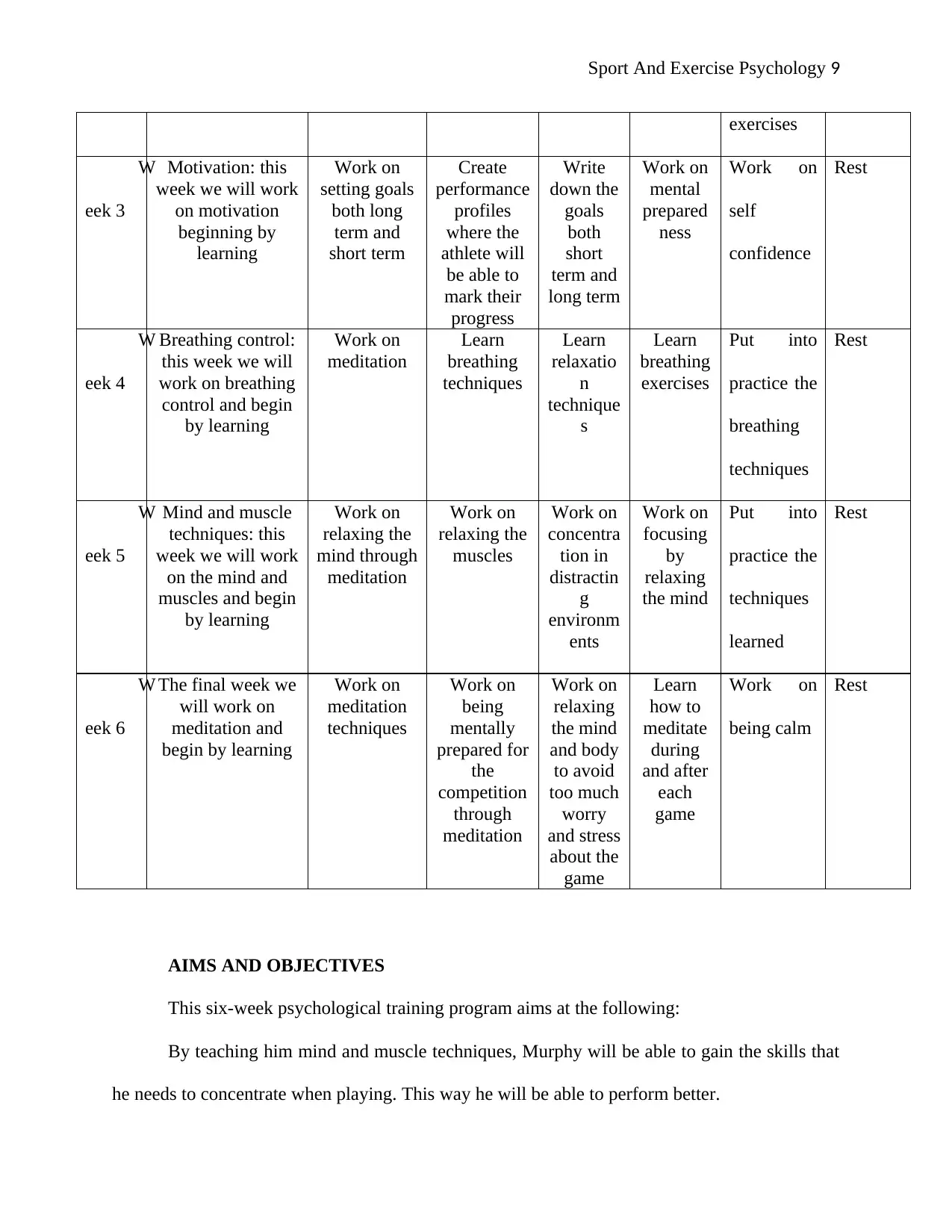
Sport And Exercise Psychology 9
exercises
W
eek 3
Motivation: this
week we will work
on motivation
beginning by
learning
Work on
setting goals
both long
term and
short term
Create
performance
profiles
where the
athlete will
be able to
mark their
progress
Write
down the
goals
both
short
term and
long term
Work on
mental
prepared
ness
Work on
self
confidence
Rest
W
eek 4
Breathing control:
this week we will
work on breathing
control and begin
by learning
Work on
meditation
Learn
breathing
techniques
Learn
relaxatio
n
technique
s
Learn
breathing
exercises
Put into
practice the
breathing
techniques
Rest
W
eek 5
Mind and muscle
techniques: this
week we will work
on the mind and
muscles and begin
by learning
Work on
relaxing the
mind through
meditation
Work on
relaxing the
muscles
Work on
concentra
tion in
distractin
g
environm
ents
Work on
focusing
by
relaxing
the mind
Put into
practice the
techniques
learned
Rest
W
eek 6
The final week we
will work on
meditation and
begin by learning
Work on
meditation
techniques
Work on
being
mentally
prepared for
the
competition
through
meditation
Work on
relaxing
the mind
and body
to avoid
too much
worry
and stress
about the
game
Learn
how to
meditate
during
and after
each
game
Work on
being calm
Rest
AIMS AND OBJECTIVES
This six-week psychological training program aims at the following:
By teaching him mind and muscle techniques, Murphy will be able to gain the skills that
he needs to concentrate when playing. This way he will be able to perform better.
exercises
W
eek 3
Motivation: this
week we will work
on motivation
beginning by
learning
Work on
setting goals
both long
term and
short term
Create
performance
profiles
where the
athlete will
be able to
mark their
progress
Write
down the
goals
both
short
term and
long term
Work on
mental
prepared
ness
Work on
self
confidence
Rest
W
eek 4
Breathing control:
this week we will
work on breathing
control and begin
by learning
Work on
meditation
Learn
breathing
techniques
Learn
relaxatio
n
technique
s
Learn
breathing
exercises
Put into
practice the
breathing
techniques
Rest
W
eek 5
Mind and muscle
techniques: this
week we will work
on the mind and
muscles and begin
by learning
Work on
relaxing the
mind through
meditation
Work on
relaxing the
muscles
Work on
concentra
tion in
distractin
g
environm
ents
Work on
focusing
by
relaxing
the mind
Put into
practice the
techniques
learned
Rest
W
eek 6
The final week we
will work on
meditation and
begin by learning
Work on
meditation
techniques
Work on
being
mentally
prepared for
the
competition
through
meditation
Work on
relaxing
the mind
and body
to avoid
too much
worry
and stress
about the
game
Learn
how to
meditate
during
and after
each
game
Work on
being calm
Rest
AIMS AND OBJECTIVES
This six-week psychological training program aims at the following:
By teaching him mind and muscle techniques, Murphy will be able to gain the skills that
he needs to concentrate when playing. This way he will be able to perform better.
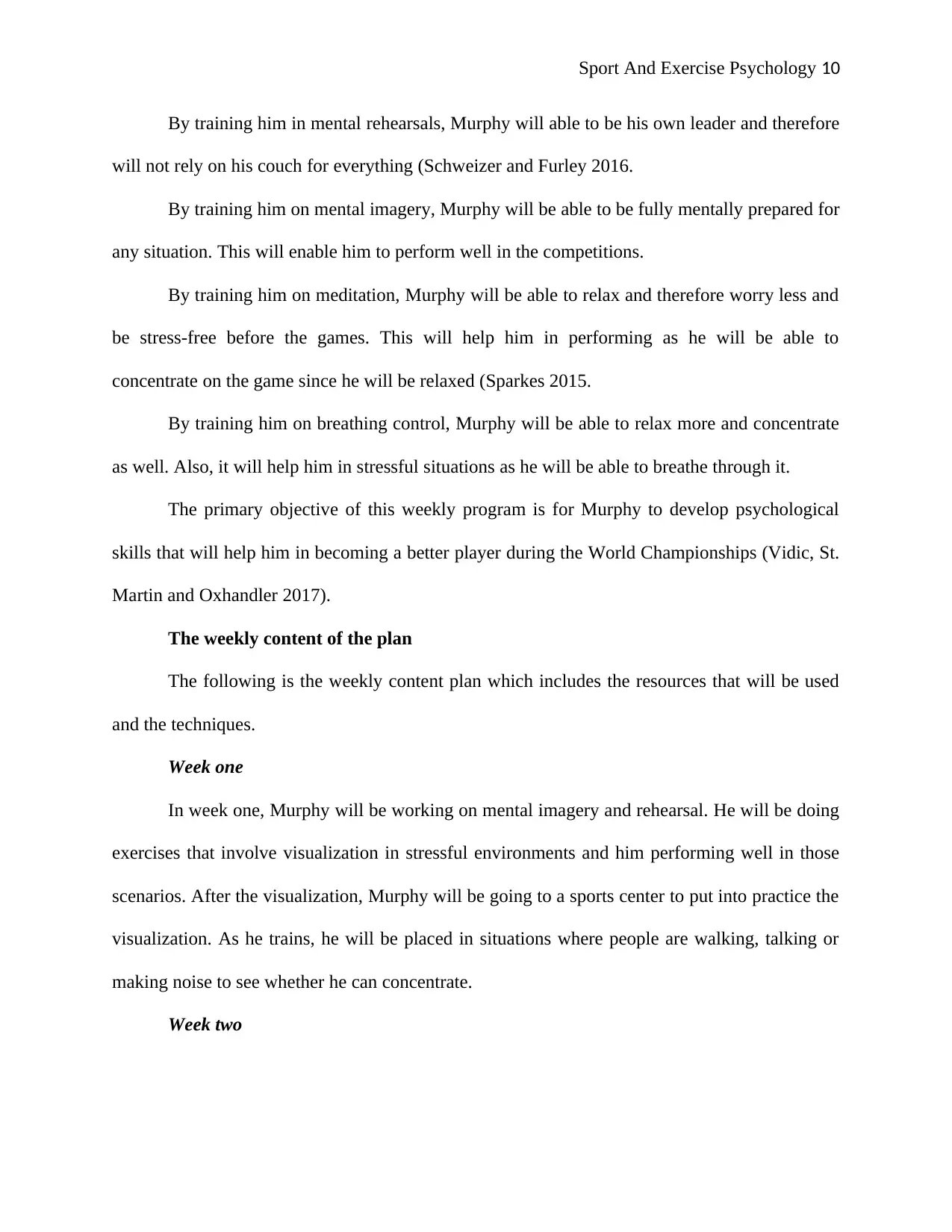
Sport And Exercise Psychology 10
By training him in mental rehearsals, Murphy will able to be his own leader and therefore
will not rely on his couch for everything (Schweizer and Furley 2016.
By training him on mental imagery, Murphy will be able to be fully mentally prepared for
any situation. This will enable him to perform well in the competitions.
By training him on meditation, Murphy will be able to relax and therefore worry less and
be stress-free before the games. This will help him in performing as he will be able to
concentrate on the game since he will be relaxed (Sparkes 2015.
By training him on breathing control, Murphy will be able to relax more and concentrate
as well. Also, it will help him in stressful situations as he will be able to breathe through it.
The primary objective of this weekly program is for Murphy to develop psychological
skills that will help him in becoming a better player during the World Championships (Vidic, St.
Martin and Oxhandler 2017).
The weekly content of the plan
The following is the weekly content plan which includes the resources that will be used
and the techniques.
Week one
In week one, Murphy will be working on mental imagery and rehearsal. He will be doing
exercises that involve visualization in stressful environments and him performing well in those
scenarios. After the visualization, Murphy will be going to a sports center to put into practice the
visualization. As he trains, he will be placed in situations where people are walking, talking or
making noise to see whether he can concentrate.
Week two
By training him in mental rehearsals, Murphy will able to be his own leader and therefore
will not rely on his couch for everything (Schweizer and Furley 2016.
By training him on mental imagery, Murphy will be able to be fully mentally prepared for
any situation. This will enable him to perform well in the competitions.
By training him on meditation, Murphy will be able to relax and therefore worry less and
be stress-free before the games. This will help him in performing as he will be able to
concentrate on the game since he will be relaxed (Sparkes 2015.
By training him on breathing control, Murphy will be able to relax more and concentrate
as well. Also, it will help him in stressful situations as he will be able to breathe through it.
The primary objective of this weekly program is for Murphy to develop psychological
skills that will help him in becoming a better player during the World Championships (Vidic, St.
Martin and Oxhandler 2017).
The weekly content of the plan
The following is the weekly content plan which includes the resources that will be used
and the techniques.
Week one
In week one, Murphy will be working on mental imagery and rehearsal. He will be doing
exercises that involve visualization in stressful environments and him performing well in those
scenarios. After the visualization, Murphy will be going to a sports center to put into practice the
visualization. As he trains, he will be placed in situations where people are walking, talking or
making noise to see whether he can concentrate.
Week two
Secure Best Marks with AI Grader
Need help grading? Try our AI Grader for instant feedback on your assignments.
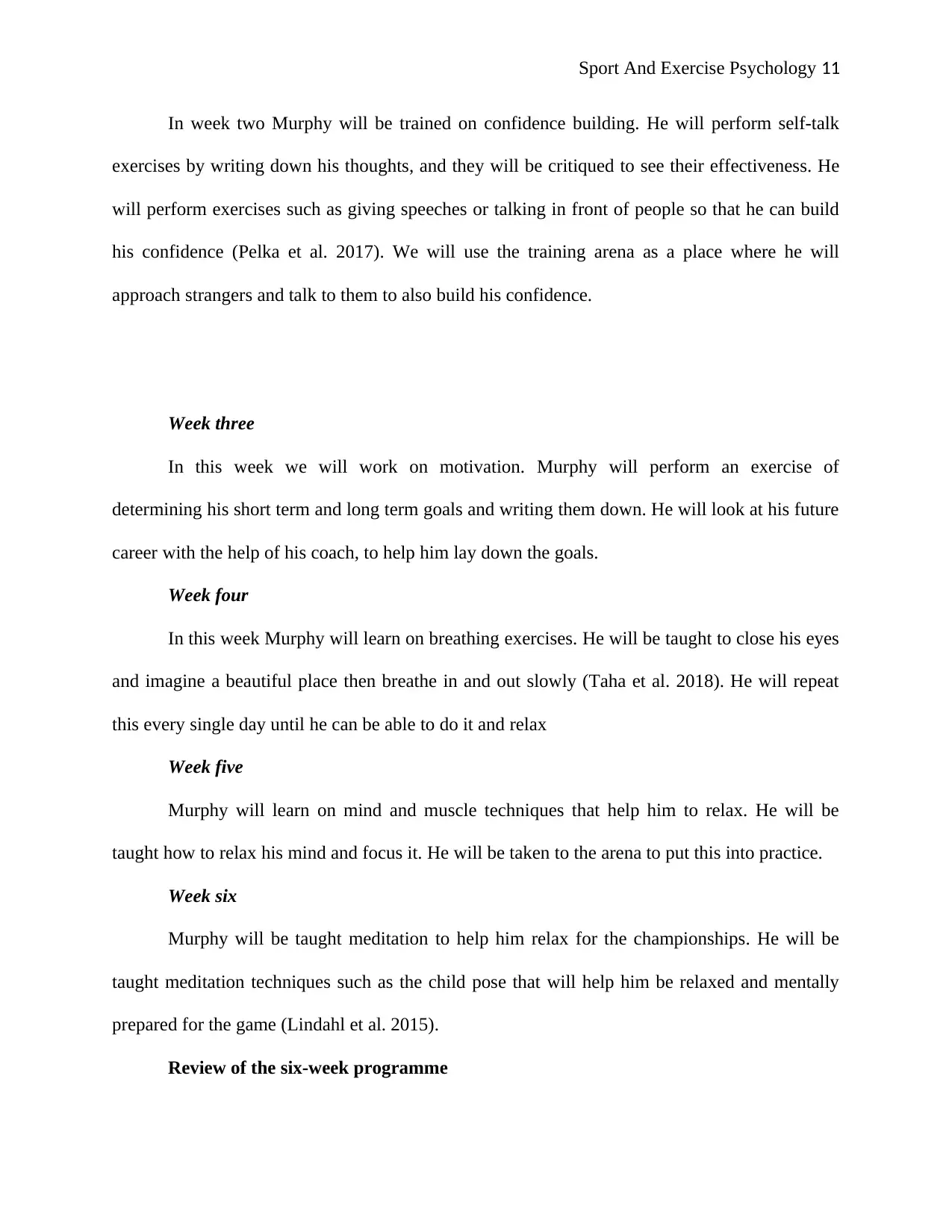
Sport And Exercise Psychology 11
In week two Murphy will be trained on confidence building. He will perform self-talk
exercises by writing down his thoughts, and they will be critiqued to see their effectiveness. He
will perform exercises such as giving speeches or talking in front of people so that he can build
his confidence (Pelka et al. 2017). We will use the training arena as a place where he will
approach strangers and talk to them to also build his confidence.
Week three
In this week we will work on motivation. Murphy will perform an exercise of
determining his short term and long term goals and writing them down. He will look at his future
career with the help of his coach, to help him lay down the goals.
Week four
In this week Murphy will learn on breathing exercises. He will be taught to close his eyes
and imagine a beautiful place then breathe in and out slowly (Taha et al. 2018). He will repeat
this every single day until he can be able to do it and relax
Week five
Murphy will learn on mind and muscle techniques that help him to relax. He will be
taught how to relax his mind and focus it. He will be taken to the arena to put this into practice.
Week six
Murphy will be taught meditation to help him relax for the championships. He will be
taught meditation techniques such as the child pose that will help him be relaxed and mentally
prepared for the game (Lindahl et al. 2015).
Review of the six-week programme
In week two Murphy will be trained on confidence building. He will perform self-talk
exercises by writing down his thoughts, and they will be critiqued to see their effectiveness. He
will perform exercises such as giving speeches or talking in front of people so that he can build
his confidence (Pelka et al. 2017). We will use the training arena as a place where he will
approach strangers and talk to them to also build his confidence.
Week three
In this week we will work on motivation. Murphy will perform an exercise of
determining his short term and long term goals and writing them down. He will look at his future
career with the help of his coach, to help him lay down the goals.
Week four
In this week Murphy will learn on breathing exercises. He will be taught to close his eyes
and imagine a beautiful place then breathe in and out slowly (Taha et al. 2018). He will repeat
this every single day until he can be able to do it and relax
Week five
Murphy will learn on mind and muscle techniques that help him to relax. He will be
taught how to relax his mind and focus it. He will be taken to the arena to put this into practice.
Week six
Murphy will be taught meditation to help him relax for the championships. He will be
taught meditation techniques such as the child pose that will help him be relaxed and mentally
prepared for the game (Lindahl et al. 2015).
Review of the six-week programme
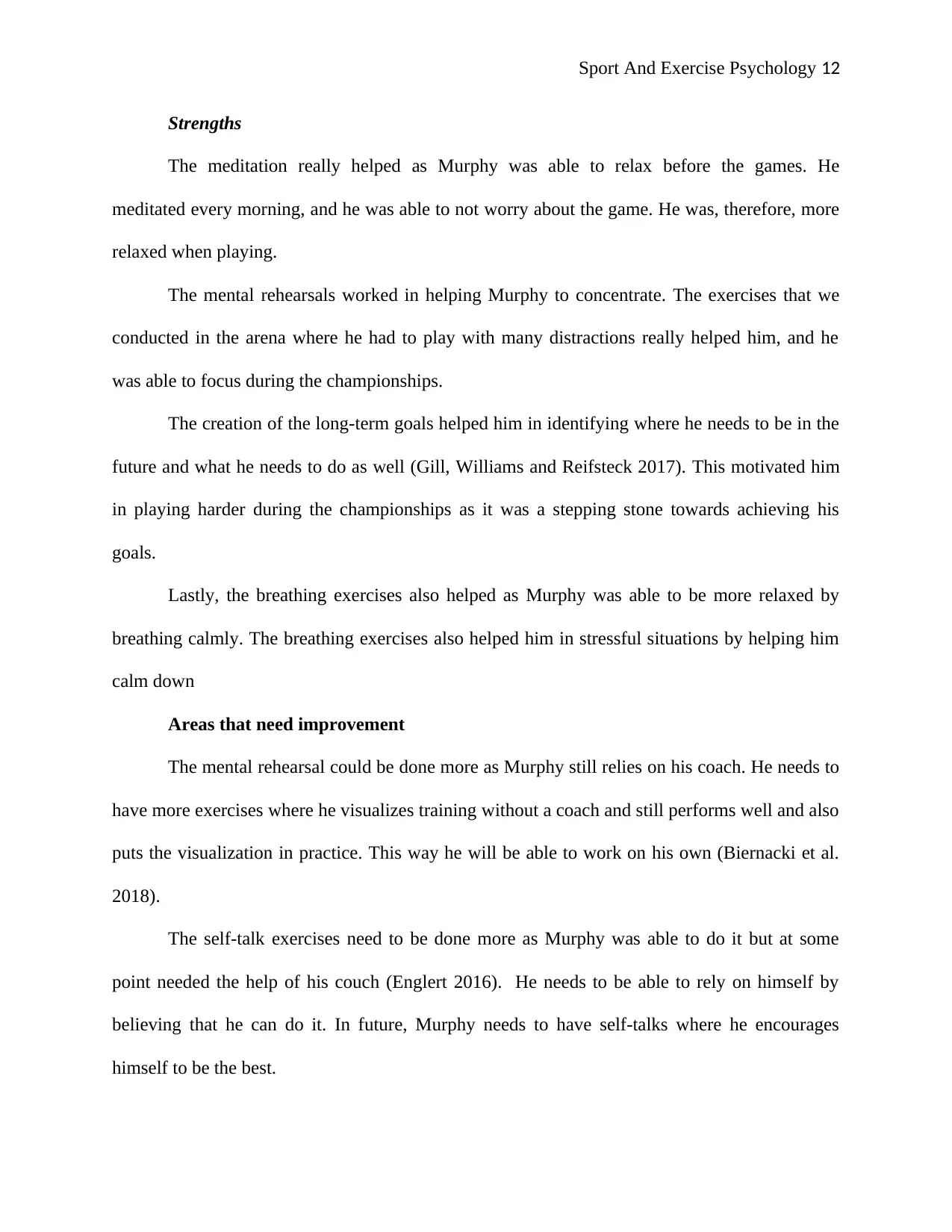
Sport And Exercise Psychology 12
Strengths
The meditation really helped as Murphy was able to relax before the games. He
meditated every morning, and he was able to not worry about the game. He was, therefore, more
relaxed when playing.
The mental rehearsals worked in helping Murphy to concentrate. The exercises that we
conducted in the arena where he had to play with many distractions really helped him, and he
was able to focus during the championships.
The creation of the long-term goals helped him in identifying where he needs to be in the
future and what he needs to do as well (Gill, Williams and Reifsteck 2017). This motivated him
in playing harder during the championships as it was a stepping stone towards achieving his
goals.
Lastly, the breathing exercises also helped as Murphy was able to be more relaxed by
breathing calmly. The breathing exercises also helped him in stressful situations by helping him
calm down
Areas that need improvement
The mental rehearsal could be done more as Murphy still relies on his coach. He needs to
have more exercises where he visualizes training without a coach and still performs well and also
puts the visualization in practice. This way he will be able to work on his own (Biernacki et al.
2018).
The self-talk exercises need to be done more as Murphy was able to do it but at some
point needed the help of his couch (Englert 2016). He needs to be able to rely on himself by
believing that he can do it. In future, Murphy needs to have self-talks where he encourages
himself to be the best.
Strengths
The meditation really helped as Murphy was able to relax before the games. He
meditated every morning, and he was able to not worry about the game. He was, therefore, more
relaxed when playing.
The mental rehearsals worked in helping Murphy to concentrate. The exercises that we
conducted in the arena where he had to play with many distractions really helped him, and he
was able to focus during the championships.
The creation of the long-term goals helped him in identifying where he needs to be in the
future and what he needs to do as well (Gill, Williams and Reifsteck 2017). This motivated him
in playing harder during the championships as it was a stepping stone towards achieving his
goals.
Lastly, the breathing exercises also helped as Murphy was able to be more relaxed by
breathing calmly. The breathing exercises also helped him in stressful situations by helping him
calm down
Areas that need improvement
The mental rehearsal could be done more as Murphy still relies on his coach. He needs to
have more exercises where he visualizes training without a coach and still performs well and also
puts the visualization in practice. This way he will be able to work on his own (Biernacki et al.
2018).
The self-talk exercises need to be done more as Murphy was able to do it but at some
point needed the help of his couch (Englert 2016). He needs to be able to rely on himself by
believing that he can do it. In future, Murphy needs to have self-talks where he encourages
himself to be the best.
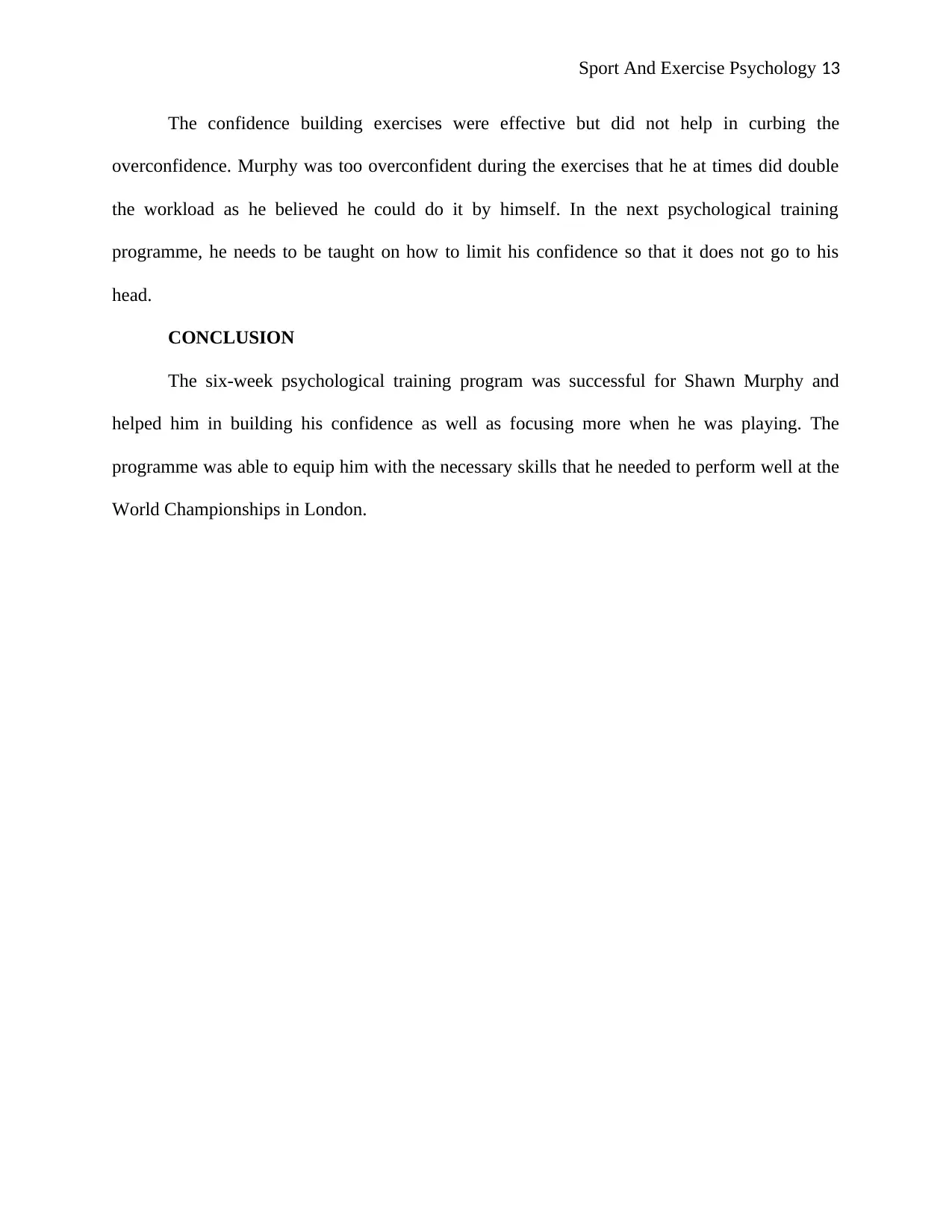
Sport And Exercise Psychology 13
The confidence building exercises were effective but did not help in curbing the
overconfidence. Murphy was too overconfident during the exercises that he at times did double
the workload as he believed he could do it by himself. In the next psychological training
programme, he needs to be taught on how to limit his confidence so that it does not go to his
head.
CONCLUSION
The six-week psychological training program was successful for Shawn Murphy and
helped him in building his confidence as well as focusing more when he was playing. The
programme was able to equip him with the necessary skills that he needed to perform well at the
World Championships in London.
The confidence building exercises were effective but did not help in curbing the
overconfidence. Murphy was too overconfident during the exercises that he at times did double
the workload as he believed he could do it by himself. In the next psychological training
programme, he needs to be taught on how to limit his confidence so that it does not go to his
head.
CONCLUSION
The six-week psychological training program was successful for Shawn Murphy and
helped him in building his confidence as well as focusing more when he was playing. The
programme was able to equip him with the necessary skills that he needed to perform well at the
World Championships in London.
Paraphrase This Document
Need a fresh take? Get an instant paraphrase of this document with our AI Paraphraser
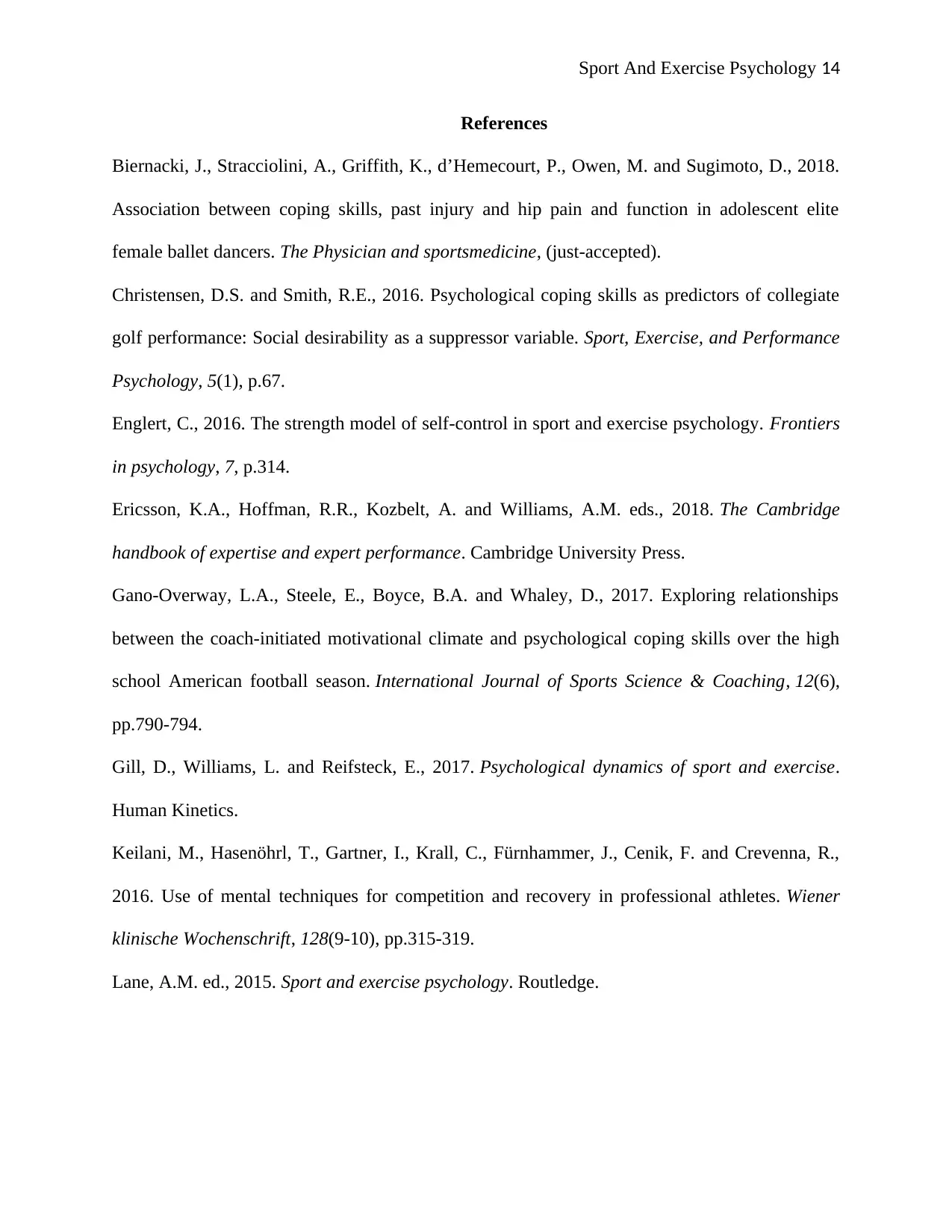
Sport And Exercise Psychology 14
References
Biernacki, J., Stracciolini, A., Griffith, K., d’Hemecourt, P., Owen, M. and Sugimoto, D., 2018.
Association between coping skills, past injury and hip pain and function in adolescent elite
female ballet dancers. The Physician and sportsmedicine, (just-accepted).
Christensen, D.S. and Smith, R.E., 2016. Psychological coping skills as predictors of collegiate
golf performance: Social desirability as a suppressor variable. Sport, Exercise, and Performance
Psychology, 5(1), p.67.
Englert, C., 2016. The strength model of self-control in sport and exercise psychology. Frontiers
in psychology, 7, p.314.
Ericsson, K.A., Hoffman, R.R., Kozbelt, A. and Williams, A.M. eds., 2018. The Cambridge
handbook of expertise and expert performance. Cambridge University Press.
Gano-Overway, L.A., Steele, E., Boyce, B.A. and Whaley, D., 2017. Exploring relationships
between the coach-initiated motivational climate and psychological coping skills over the high
school American football season. International Journal of Sports Science & Coaching, 12(6),
pp.790-794.
Gill, D., Williams, L. and Reifsteck, E., 2017. Psychological dynamics of sport and exercise.
Human Kinetics.
Keilani, M., Hasenöhrl, T., Gartner, I., Krall, C., Fürnhammer, J., Cenik, F. and Crevenna, R.,
2016. Use of mental techniques for competition and recovery in professional athletes. Wiener
klinische Wochenschrift, 128(9-10), pp.315-319.
Lane, A.M. ed., 2015. Sport and exercise psychology. Routledge.
References
Biernacki, J., Stracciolini, A., Griffith, K., d’Hemecourt, P., Owen, M. and Sugimoto, D., 2018.
Association between coping skills, past injury and hip pain and function in adolescent elite
female ballet dancers. The Physician and sportsmedicine, (just-accepted).
Christensen, D.S. and Smith, R.E., 2016. Psychological coping skills as predictors of collegiate
golf performance: Social desirability as a suppressor variable. Sport, Exercise, and Performance
Psychology, 5(1), p.67.
Englert, C., 2016. The strength model of self-control in sport and exercise psychology. Frontiers
in psychology, 7, p.314.
Ericsson, K.A., Hoffman, R.R., Kozbelt, A. and Williams, A.M. eds., 2018. The Cambridge
handbook of expertise and expert performance. Cambridge University Press.
Gano-Overway, L.A., Steele, E., Boyce, B.A. and Whaley, D., 2017. Exploring relationships
between the coach-initiated motivational climate and psychological coping skills over the high
school American football season. International Journal of Sports Science & Coaching, 12(6),
pp.790-794.
Gill, D., Williams, L. and Reifsteck, E., 2017. Psychological dynamics of sport and exercise.
Human Kinetics.
Keilani, M., Hasenöhrl, T., Gartner, I., Krall, C., Fürnhammer, J., Cenik, F. and Crevenna, R.,
2016. Use of mental techniques for competition and recovery in professional athletes. Wiener
klinische Wochenschrift, 128(9-10), pp.315-319.
Lane, A.M. ed., 2015. Sport and exercise psychology. Routledge.
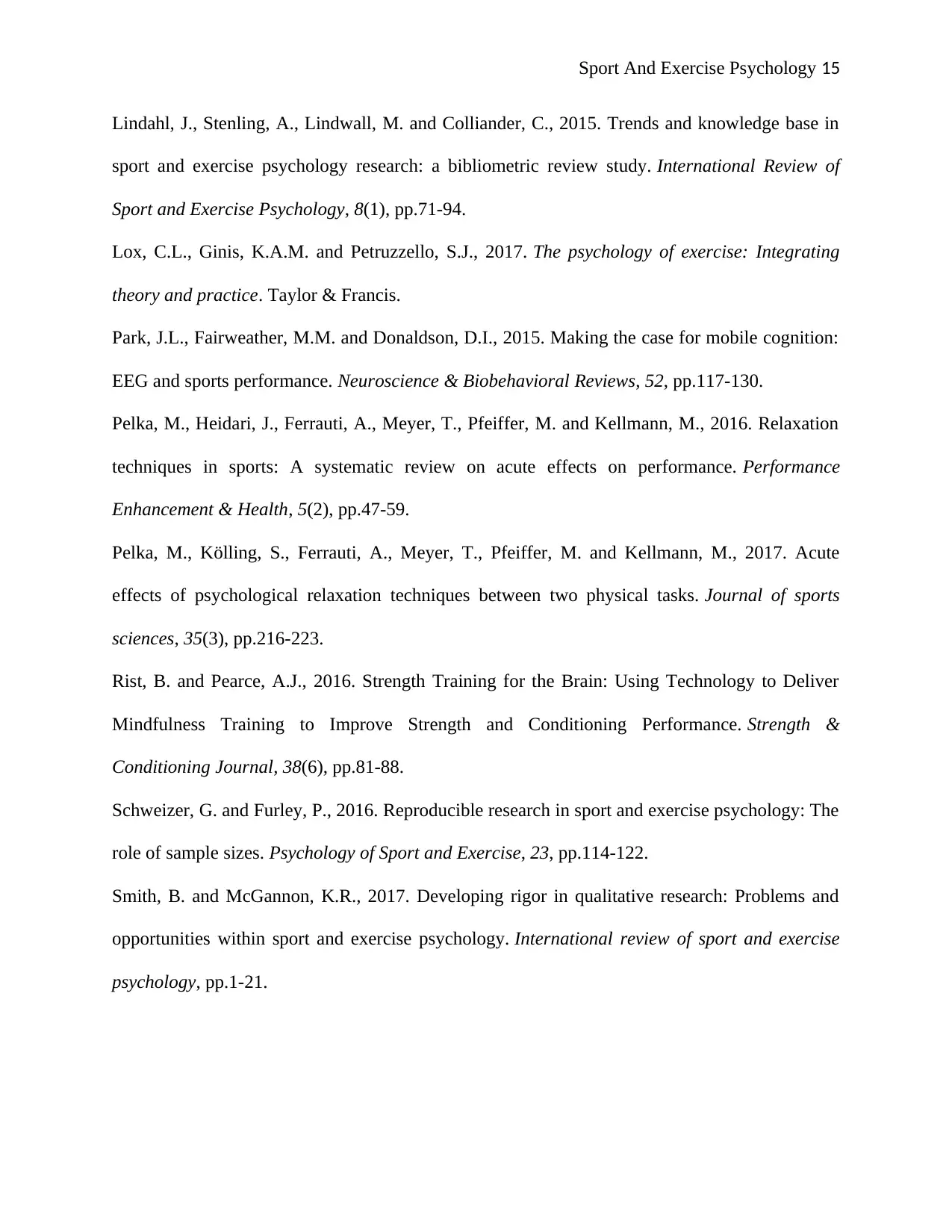
Sport And Exercise Psychology 15
Lindahl, J., Stenling, A., Lindwall, M. and Colliander, C., 2015. Trends and knowledge base in
sport and exercise psychology research: a bibliometric review study. International Review of
Sport and Exercise Psychology, 8(1), pp.71-94.
Lox, C.L., Ginis, K.A.M. and Petruzzello, S.J., 2017. The psychology of exercise: Integrating
theory and practice. Taylor & Francis.
Park, J.L., Fairweather, M.M. and Donaldson, D.I., 2015. Making the case for mobile cognition:
EEG and sports performance. Neuroscience & Biobehavioral Reviews, 52, pp.117-130.
Pelka, M., Heidari, J., Ferrauti, A., Meyer, T., Pfeiffer, M. and Kellmann, M., 2016. Relaxation
techniques in sports: A systematic review on acute effects on performance. Performance
Enhancement & Health, 5(2), pp.47-59.
Pelka, M., Kölling, S., Ferrauti, A., Meyer, T., Pfeiffer, M. and Kellmann, M., 2017. Acute
effects of psychological relaxation techniques between two physical tasks. Journal of sports
sciences, 35(3), pp.216-223.
Rist, B. and Pearce, A.J., 2016. Strength Training for the Brain: Using Technology to Deliver
Mindfulness Training to Improve Strength and Conditioning Performance. Strength &
Conditioning Journal, 38(6), pp.81-88.
Schweizer, G. and Furley, P., 2016. Reproducible research in sport and exercise psychology: The
role of sample sizes. Psychology of Sport and Exercise, 23, pp.114-122.
Smith, B. and McGannon, K.R., 2017. Developing rigor in qualitative research: Problems and
opportunities within sport and exercise psychology. International review of sport and exercise
psychology, pp.1-21.
Lindahl, J., Stenling, A., Lindwall, M. and Colliander, C., 2015. Trends and knowledge base in
sport and exercise psychology research: a bibliometric review study. International Review of
Sport and Exercise Psychology, 8(1), pp.71-94.
Lox, C.L., Ginis, K.A.M. and Petruzzello, S.J., 2017. The psychology of exercise: Integrating
theory and practice. Taylor & Francis.
Park, J.L., Fairweather, M.M. and Donaldson, D.I., 2015. Making the case for mobile cognition:
EEG and sports performance. Neuroscience & Biobehavioral Reviews, 52, pp.117-130.
Pelka, M., Heidari, J., Ferrauti, A., Meyer, T., Pfeiffer, M. and Kellmann, M., 2016. Relaxation
techniques in sports: A systematic review on acute effects on performance. Performance
Enhancement & Health, 5(2), pp.47-59.
Pelka, M., Kölling, S., Ferrauti, A., Meyer, T., Pfeiffer, M. and Kellmann, M., 2017. Acute
effects of psychological relaxation techniques between two physical tasks. Journal of sports
sciences, 35(3), pp.216-223.
Rist, B. and Pearce, A.J., 2016. Strength Training for the Brain: Using Technology to Deliver
Mindfulness Training to Improve Strength and Conditioning Performance. Strength &
Conditioning Journal, 38(6), pp.81-88.
Schweizer, G. and Furley, P., 2016. Reproducible research in sport and exercise psychology: The
role of sample sizes. Psychology of Sport and Exercise, 23, pp.114-122.
Smith, B. and McGannon, K.R., 2017. Developing rigor in qualitative research: Problems and
opportunities within sport and exercise psychology. International review of sport and exercise
psychology, pp.1-21.
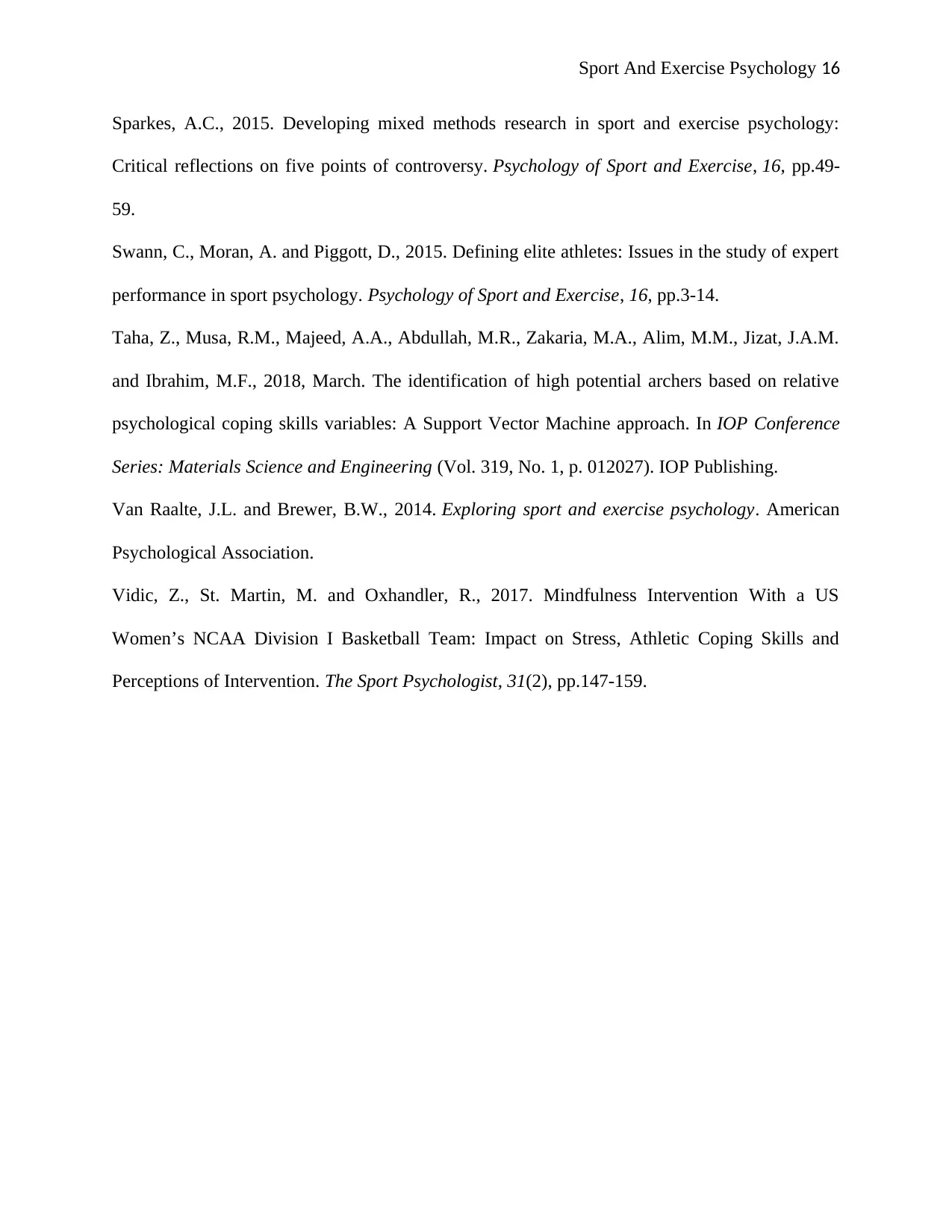
Sport And Exercise Psychology 16
Sparkes, A.C., 2015. Developing mixed methods research in sport and exercise psychology:
Critical reflections on five points of controversy. Psychology of Sport and Exercise, 16, pp.49-
59.
Swann, C., Moran, A. and Piggott, D., 2015. Defining elite athletes: Issues in the study of expert
performance in sport psychology. Psychology of Sport and Exercise, 16, pp.3-14.
Taha, Z., Musa, R.M., Majeed, A.A., Abdullah, M.R., Zakaria, M.A., Alim, M.M., Jizat, J.A.M.
and Ibrahim, M.F., 2018, March. The identification of high potential archers based on relative
psychological coping skills variables: A Support Vector Machine approach. In IOP Conference
Series: Materials Science and Engineering (Vol. 319, No. 1, p. 012027). IOP Publishing.
Van Raalte, J.L. and Brewer, B.W., 2014. Exploring sport and exercise psychology. American
Psychological Association.
Vidic, Z., St. Martin, M. and Oxhandler, R., 2017. Mindfulness Intervention With a US
Women’s NCAA Division I Basketball Team: Impact on Stress, Athletic Coping Skills and
Perceptions of Intervention. The Sport Psychologist, 31(2), pp.147-159.
Sparkes, A.C., 2015. Developing mixed methods research in sport and exercise psychology:
Critical reflections on five points of controversy. Psychology of Sport and Exercise, 16, pp.49-
59.
Swann, C., Moran, A. and Piggott, D., 2015. Defining elite athletes: Issues in the study of expert
performance in sport psychology. Psychology of Sport and Exercise, 16, pp.3-14.
Taha, Z., Musa, R.M., Majeed, A.A., Abdullah, M.R., Zakaria, M.A., Alim, M.M., Jizat, J.A.M.
and Ibrahim, M.F., 2018, March. The identification of high potential archers based on relative
psychological coping skills variables: A Support Vector Machine approach. In IOP Conference
Series: Materials Science and Engineering (Vol. 319, No. 1, p. 012027). IOP Publishing.
Van Raalte, J.L. and Brewer, B.W., 2014. Exploring sport and exercise psychology. American
Psychological Association.
Vidic, Z., St. Martin, M. and Oxhandler, R., 2017. Mindfulness Intervention With a US
Women’s NCAA Division I Basketball Team: Impact on Stress, Athletic Coping Skills and
Perceptions of Intervention. The Sport Psychologist, 31(2), pp.147-159.
1 out of 16
Related Documents
Your All-in-One AI-Powered Toolkit for Academic Success.
+13062052269
info@desklib.com
Available 24*7 on WhatsApp / Email
![[object Object]](/_next/static/media/star-bottom.7253800d.svg)
Unlock your academic potential
© 2024 | Zucol Services PVT LTD | All rights reserved.
